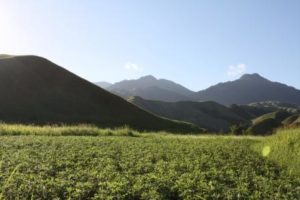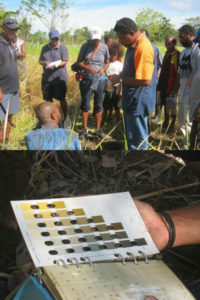SPC/GIZ Coping with Climate Change in the Pacific Islands Region (CCCPIR) programme
At the national level, SPC/GIZ CCCPIR supported an assessment study on  the institutional framework for the proposed climate change authority. The report is to be formally submitted to the Executive Secretary of the Office of Climate Change and Development (OCCD).
the institutional framework for the proposed climate change authority. The report is to be formally submitted to the Executive Secretary of the Office of Climate Change and Development (OCCD).
A training session on publication tools was carried out in 2012 for some member agencies of the National Climate Change Working Group to support the development of effective awareness and promotional materials. The PNG National Agricultural Research Institute and OCCD have jointly developed an array of materials related to food security and climate change. These are being finalised for publishing. A series of informational papers on climate change adaptation and disaster risk management and a children’s book on climate change are to be developed this year.
Kivori 
The Kivori pilot site in Central Province is also the pilot site for the Pacific Adaptation to Climate Change (PACC) project.
During the inception national planning workshop in Port Moresby in 2011, SPC/GIZ CCCPIR was asked about the potential for the programme to work in Kivori to fill in the 'gaps' not covered by the PACC Project. This was a very feasible proposal, given that relationships had been established, community institutions set up and awareness on climate change issues were already being carried out. The gaps were enhancing the food source and food supply of the local communities and the promotion of sustainable agricultural practices. Extreme seasons are becoming the norm in the Kivori area and SPC/GIZ CCCPIR is supporting the establishment of three crop multiplication sites (where plants are multiplied to increase agricultural supply) for the three main Kivori communities to ensure the availability of and access to appropriate climate-ready planting materials. Techniques on food processing and preservation will be carried out. A food security vulnerability assessment, soil survey, farmer training and awareness, grafting of climate-ready crop varieties and development of the resource sites have been undertaken.
Wamira District
Part of the Wamira District in Milne Bay was identified in February 2011 as the second pilot site. The main request from the community was the preservation (and some adaptation) of their impressive traditional taro irrigation system. For Wamira, food security is also the main area of focus. A vulnerability and adaptation assessment will be carried out.
Both the above pilot sites have a strong element of capacity development for women.